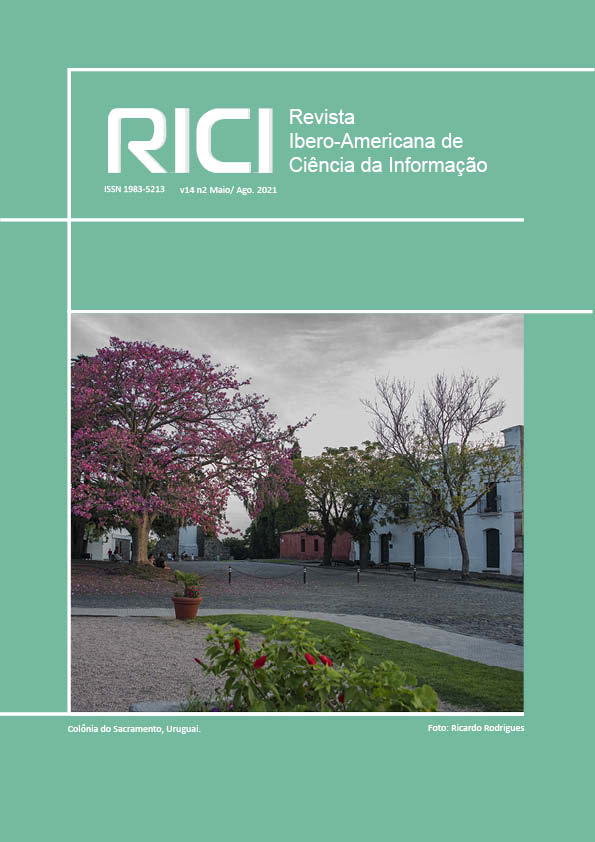Academic data management: the application of data governance concepts to improve the processes of using information from the academic data management system
DOI:
https://doi.org/10.26512/rici.v14.n2.2021.33872Keywords:
Academic system., Governance., Information technology., Data governance.Abstract
The objective of this research is to apply the concepts of data governance in order to identify improvement opportunities for the reuse of data included in the University’s academic management system. This makes it possible to enhance data quality, to avoid rework and to ensure the publication of information according to the visual identity of the institution. As for the methodological aspects, this study is an applied research, with an exploratory nature, in which the authors intended to identify and explore existing problems in the academic management system and also suggest a practical solution for the rework of the information included in such system and published on the University’s portal. As a result, it was observed the necessity of creating new processes by defining roles and responsibilities to promote the integration, organization and the correct grouping of data, ensuring that the information provided is always updated and consistent between systems. It is understood that the good practices of data governance and the tools used in this research contributed to the identification of improvement opportunities for the processes of using data from the Institution’s academic management system as both internal and external information.
Downloads
References
ARRUDA, June Alves de; BARROS, Gustavo Filice de. Governança Universitária: Um Panorama Mundial. Florianópolis: Repositório Institucional da UFSC, 24 out. 2018. Disponível em: https://repositorio.ufsc.br/handle/123456789/190509 Acesso em: 20 dez. 2020.
BARBIERI, Carlos. Governança de Dados: Práticas, conceitos e novos caminhos. Rio de Janeiro: Alta Books, 2020.
BARATA, André Montoia. Governança de dados em organizações brasileiras: uma avaliação comparativa entre os benefícios previstos na literatura e os obtidos pelas organizações. 2015. 155 f. Dissertação (Mestrado) - Curso de Sistemas de Informação, Universidade de São Paulo, São Paulo, 2015.
BEVIR, Mark. Governance: A Very Short Introduction. Oxford, 2012.
BIJL, Marco; DEVLIN, James P.; RUTING, David. Process Model Canvas. Amsterdam, Netherlands, 2014. Disponível em: http://www.processmodelcanvas.com/ Acesso em: 20 jul. 2020.
CALMON, Paulo; COSTA, Arthur Trindade Maranhão. Redes e governança das políticas públicas. RP3-Revista de Pesquisa em Políticas Públicas, n. 1, 2013.
COLOMBI, Luca. Using the Situation Analysis Canvas. London: UK, 2014. Disponível em: https://honoslc.wordpress.com/2014/12/18/using-the-situation-analysis-canvas Acesso em: 20 jul. 2020.
DEL-MASSO, Maria Candida Soares; COTTA, Maria Amélia de Castro; SANTOS, Marisa Aparecida Pereira. Ética em Pesquisa Científica: Conceitos e Finalidades. São Paulo: Unesp, 2014. Disponível em: http://acervodigital.unesp.br/handle/unesp/155306 Acesso em: 10 ago. 2020.
FERNANDES, Aguinaldo Aragon; ABREU, Vladimir Ferraz de. Implantando a governança de TI: da estratégia à gestão dos processos e serviços. 4. ed. Rio de Janeiro: Brasport, 2014. IT GOVERNANCE INSTITUTE. What is IT governance? Disponível em: https://www.itgovernance.co.uk/it_governance Acesso em: 18 jul. 2020.
INTERNATIONAL INSTITUTE OF BUSINESS ANALYSIS (IIBA). Um guia para o Corpo de Conhecimento de Análise de Negócios(TM) (Guia BABOK®). Toronto, Ontario: IIBA, 2011.
LADLEY John. Data Governance: How to Design, Deploy and Sustain an Effective Data Governance Program. Waltham: Newnes, 2012.
LIMA, João Alberto de Oliveira. Pesquisa-ação em Ciência da Informação. In: MUELLER, Suzana Pinheiro Machado (Org.). Métodos para a pesquisa em Ciência da Informação. Brasília: Thesaurus, 2007.
OSTERWALDER, A.; PIGNEUR, Y. Business Model Generation ”“ Inovação em Modelo de Negócios: um manual para visionários, inovadores e revolucionários. Rio de Janeiro: Alta Books, 2011.
PRODANOV, Cleber Cristiano; FREITAS, Ernani Cesar de. Metodologia do Trabalho Científico: Métodos e Técnicas da Pesquisa e do Trabalho Acadêmico. 2. ed. Novo Hamburgo: FEEVALE, 2013.
RÊGO, Bergson Lopes. Gestão e Governança de Dados: Promovendo dados como ativo de valor nas empresas. Rio de Janeiro: Brasport, 2013.
RODRIGUES, Maria Lucia; LIMENA, Maria Margarida Cavalcanti (Org.). Metodologias multidimensionais em Ciências Humanas. Brasília: Líber Livros Editora, 2006.
SANTOS, Isabel Maria Francisca dos. Uma proposta de governança de dados baseada em um método de desenvolvimento de arquitetura empresarial. 2010. 140 p. Dissertação (Mestrado em Informática) ”“ Centro de Ciências Exatas e Tecnologia, Universidade Federal do Rio de Janeiro, Rio de Janeiro, 2010. Disponível em: http://www2.uniriotec.br/ppgi/banco-de-dissertacoes-ppgi-unirio/ano-2010/uma-propostade-governanca-de-dados-baseada-em-um-metodo-de-desenvolvimento-de-arquiteturaempresarial/view Acesso em: 18 jul. 2020
TUZZOLO, Orlando. Governança e estratégia de tecnologia da informação. São Paulo: Senac, 2019.
ZANELLA, Liane Carly Hermes. Metodologia de pesquisa. 2. ed. Florianópolis: Departamento de Ciências da Administração/UFSC, 2013.
Downloads
Published
How to Cite
Issue
Section
License
Copyright (c) 2021 Clarice Buss, José Francisco Salm Junior, Fabiana Scherer Metzner, Daniela de Andrade Rosa

This work is licensed under a Creative Commons Attribution 4.0 International License.
Copyright Notice
Authors who publish in this journal agree to the following terms:
- Authors retain copyright and grant the journal right of first publication with the work simultaneously licensed under the Creative Commons Attribution License 4.0, allowing the sharing of work and recognition of the work of authorship and initial publication in this journal.
- Authors are able to take on additional contracts separately, non-exclusive distribution of the version of the paper published in this journal (ex.: distribute to an institutional repository or publish as a book), with an acknowledgment of its initial publication in this journal.
- Authors are permitted and encouraged to distribute their work online (eg.: in institutional repositories or on their website) at any point before or during the editorial process, as it can lead to productive exchanges, as well as increase the impact and citation the published work.
















